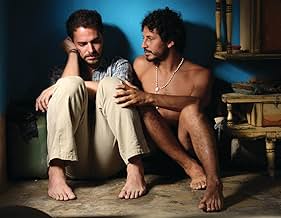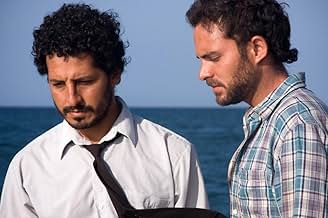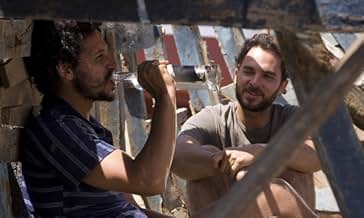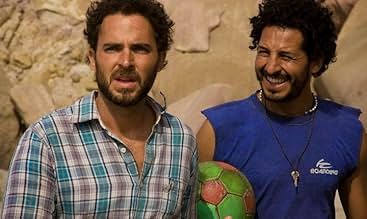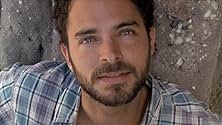VALUTAZIONE IMDb
7,7/10
7361
LA TUA VALUTAZIONE
Aggiungi una trama nella tua linguaAn unusual ghost story set on the Peruvian seaside; a married fisherman struggles to reconcile his devotion to his male lover within his town's rigid traditions.An unusual ghost story set on the Peruvian seaside; a married fisherman struggles to reconcile his devotion to his male lover within his town's rigid traditions.An unusual ghost story set on the Peruvian seaside; a married fisherman struggles to reconcile his devotion to his male lover within his town's rigid traditions.
- Regia
- Sceneggiatura
- Star
- Premi
- 13 vittorie e 13 candidature totali
Humberto Cavero
- Padre Juan
- (as Julio Humberto Cavero)
Liliana Alegría
- Carlota
- (as Liliana Alegria Saavedra)
Tomas Fernandez
- Sabino
- (as Tomás Fernández)
Recensioni in evidenza
I haven't seen such a touching gay movie since Brokeback Mountain. The movie contains so many issues, yet it could still cover them all and touch the deepest emotions in my heart. The depiction of each character is so profound that you can't help feeling the way they experienced.
Everyone is selfish when it comes to love, and so was Miguel. After he found the way how his wife and Santiago could coexist, he decided not to salvage the body and let Santiago rest in peace. He wanted Santiago to exist just for him, without the risk their relationship to be discovered. But not soon after the rumor of the painting ran wild in the village, his ideal pattern of coexistence vanished! In substitution, here comes the suspicion along with the despite from the so-called innocent village. Miguel's wife is just an ordinary woman who couldn't accept the fact that her husband was screwing other man, but the courage and tolerance she maintained is quite extraordinary. Love is the only way to get through this kind of grief. It's true for Miguel for that the loss of his lover and the courage to admit the rumor. On the other hand, it's also true for Miguel's wife who had to raise her child under this circumstance, not to mention the pressure and gossip she had to put up with.
Masculinity is always a main concept in gay movies. Therefore, Miguel had to struggle with his identification like most conservative gay did. In some way, Santiago is not just his lover, but also the desire of freedom which he had been longed for decades. When Miguel made up his mind to fulfill Santiago's last wish no matter what it costs, the determination and courage he showed really made me weep. No doubt that's the moment he found his own freedom and became a true macho!
Tragedy is when love no longer existed, so I would rather say this movie is about love and forgiveness. For those who has been struggled for their identification, this is a must see movie. Furthermore, for those who be the reason some have to struggle for anything, this is definitely a movie you can' t miss!
Everyone is selfish when it comes to love, and so was Miguel. After he found the way how his wife and Santiago could coexist, he decided not to salvage the body and let Santiago rest in peace. He wanted Santiago to exist just for him, without the risk their relationship to be discovered. But not soon after the rumor of the painting ran wild in the village, his ideal pattern of coexistence vanished! In substitution, here comes the suspicion along with the despite from the so-called innocent village. Miguel's wife is just an ordinary woman who couldn't accept the fact that her husband was screwing other man, but the courage and tolerance she maintained is quite extraordinary. Love is the only way to get through this kind of grief. It's true for Miguel for that the loss of his lover and the courage to admit the rumor. On the other hand, it's also true for Miguel's wife who had to raise her child under this circumstance, not to mention the pressure and gossip she had to put up with.
Masculinity is always a main concept in gay movies. Therefore, Miguel had to struggle with his identification like most conservative gay did. In some way, Santiago is not just his lover, but also the desire of freedom which he had been longed for decades. When Miguel made up his mind to fulfill Santiago's last wish no matter what it costs, the determination and courage he showed really made me weep. No doubt that's the moment he found his own freedom and became a true macho!
Tragedy is when love no longer existed, so I would rather say this movie is about love and forgiveness. For those who has been struggled for their identification, this is a must see movie. Furthermore, for those who be the reason some have to struggle for anything, this is definitely a movie you can' t miss!
In early 2010, the first Peruvian film ever nominated for a Foreign Language Film Oscar -- "Milk Of Sorrow" (2009) -- got a U.S. 2-screen release that grossed all of 10K. Clearly UNDERTOW has no Peruvian coattails to ride in on. Despite Sundance kudos and buzz, it's already being ghettoized as a gay film. Yet it clearly is so much more. UNDERTOW doubly violates that genre's political correctness: the lead is both closeted and heroic while the captivating tale constantly eschews white/urbane predictability. We watch two more curve balls being thrown at us as well: next-world fantasy and 3rd world folklore. So this is definitely not "'Brokeback Mountain' meets 'Ghost'" as several critics have written it off in facile reviewer shorthand. But UNDERTOW may well have the power to connect with portions of the mainstream audiences for both of those films -- via word of mouth, curiosity-building press and guerrilla marketing. Our unexpected attraction to a real-life subsistence-poor fishing village and its close-knit, tradition-bound "primitive" citizens are seamlessly woven into the film's cast as well as fabric. Breath-taking cinematography, a script illuminating characters rather than telescoping plot, understated yet powerful performances and a hypnotic world music soundtrack take UNDERTOW far beyond the shorelines of dry-docked movie-making. Many high-concept films have dealt with men forced to choose between family and lovers. Others have pitted unlikely heroes against the mores of society. Nor is a quest to carry out the final wishes of the dearly departed at all innovative. But UNDERTOW combines these themes in a way no writer- director has done before. First-timer Javier Fuentes-León does so with fearless honesty and sublime-on-a-shoestring craft. No surprise then that it's this year's Foreign Language entry from Peru.
" Undertow", gut-wrenching and quietly powerful Peruvian movie, brings back the faith in the power of story telling. This forgotten art seems to have passed by most of our contemporary film-makers. Luckily it didn't Javier Funtes-Leon. Small fishing village seemingly locked in time capsule. Grueling work, old-time believes, church on Sundays and communal meal after. Everybody knows everybody, or do they? Small towns, like little tribes, include all members of its community.Up to a point. As long as you play by their traditional rules, you'll be fine. But, just try to step out of the rhythm of the tribal tune, and they turn on you. Of course, this is a movie about a repression of gay people and the horrors they have to endure just because they are different. But, it is so much more. The indictment of empty traditions, false morals and greatest possible cheer for personal courage. This is the life we have, these are the cards we are dealt and play we must.With our head up high and damn the consequences, or hiding and trying to please all but yourself. Doesn't seems such a hard choice to me, or is it?
Profoundly moving. A fishing village that seems to come out of somebody's dream. A loving husband about to become a father and a forbidden love. Cristian Mercado in a beautifully drawn performance takes us into his own predicament with honesty and astonishing tenderness. The emotional details of his love for another man are nothing short of extraordinary. I saw the film a couple of day ago at The Latino Film Festival of Los Angeles and Cristian Mercado's face has been with me ever since. Born and bread in a deeply religious Peruvian community, he accepts his feelings but denies the truth of his own nature. Being a man of unshakable, even if unconscious, integrity he will be who he's suppose to be, with courage an kindness. I must confess, I wept. Glad to know it got an American distribution. It deserves to be seen. Congratulations.
One of the best new films exploring gay male identity, love and relationships, and likely will be a worthy addition to many personal "favorite gay films" lists, although the fact that the film is set in a town, and to some extent a culture, where, at least for a large part of the story, many in the town have not yet evolved in their views of LGBT people and issues, created some (ultimate unnecessary) anxiety for me early in the film, and at parts throughout, as to whether the film would be a throwback to older, more stereotyped and limited representations and stories of gay life, although those anxieties were not only relieved by the end of the film, but, as I suggested, the film is an extremely valuable addition to the new wave of gay cinema.
The writer, director, casting director and cast, cinematographer, set designer and other members of the film-making team also do a great job exploring rural, small town life, with its traditions (religious and otherwise...) superstitions, and class differences, and the interplay among the individuals, families and community who inhabit the town, along with the welcome (or rejection...) given to a stranger who comes there, and who many perceive as a threat to the social fabric of the town, and the support (or lack of it...) the townspeople and characters show to each other, ultimately examining the struggle between bigotry and ignorance, on the one hand, and the struggle to overcome that bigotry and ignorance, and replace it with support, respect and love on the other. Most of the townspeople are not financially well-off, but make just enough to get by, working in occupations connected to fishing and the sea, and the way they relate, individually and as a community, to each other (and to themselves, in regard to what is the true definition of a man, of an individual's self-respect) in light of a newcomer who is more financially well-off, and his artistic and suspected sexual/relationship interests, are additional themes of the film, which play out so well in a beautiful, interesting and captivating way, often evoking strong emotions, and at times offering an inspiring catharsis (and perhaps a few tears, in reaction to some sadness, and much beauty.)
And there are many other highlights of the film beyond all that, including the amazingly beautiful setting, in a rural, seaside Peruvian village, the cinematography, musical score, performances, plot twists and turns, the mix of fantasy and reality (and moments where it's unclear to what extent fantasy exists as an aspect of the story's reality.) This is a truly unique and creative film, and one of the most rewarding experiences I've had at a feature film in a long time.
The writer, director, casting director and cast, cinematographer, set designer and other members of the film-making team also do a great job exploring rural, small town life, with its traditions (religious and otherwise...) superstitions, and class differences, and the interplay among the individuals, families and community who inhabit the town, along with the welcome (or rejection...) given to a stranger who comes there, and who many perceive as a threat to the social fabric of the town, and the support (or lack of it...) the townspeople and characters show to each other, ultimately examining the struggle between bigotry and ignorance, on the one hand, and the struggle to overcome that bigotry and ignorance, and replace it with support, respect and love on the other. Most of the townspeople are not financially well-off, but make just enough to get by, working in occupations connected to fishing and the sea, and the way they relate, individually and as a community, to each other (and to themselves, in regard to what is the true definition of a man, of an individual's self-respect) in light of a newcomer who is more financially well-off, and his artistic and suspected sexual/relationship interests, are additional themes of the film, which play out so well in a beautiful, interesting and captivating way, often evoking strong emotions, and at times offering an inspiring catharsis (and perhaps a few tears, in reaction to some sadness, and much beauty.)
And there are many other highlights of the film beyond all that, including the amazingly beautiful setting, in a rural, seaside Peruvian village, the cinematography, musical score, performances, plot twists and turns, the mix of fantasy and reality (and moments where it's unclear to what extent fantasy exists as an aspect of the story's reality.) This is a truly unique and creative film, and one of the most rewarding experiences I've had at a feature film in a long time.
Lo sapevi?
- QuizAlthough both main characters are Peruvian, the actors who play them are not. Cristian Mercado (the Fisherman) is Bolivian and Manolo Cardona (the Photographer) is Colombian.
- ConnessioniFeatures Direito de Amar (1987)
I più visti
Accedi per valutare e creare un elenco di titoli salvati per ottenere consigli personalizzati
- How long is Undertow?Powered by Alexa
Dettagli
- Data di uscita
- Paesi di origine
- Siti ufficiali
- Lingua
- Celebre anche come
- Undertow
- Luoghi delle riprese
- Aziende produttrici
- Vedi altri crediti dell’azienda su IMDbPro
Botteghino
- Lordo Stati Uniti e Canada
- 108.620 USD
- Fine settimana di apertura Stati Uniti e Canada
- 6749 USD
- 19 set 2010
- Lordo in tutto il mondo
- 602.059 USD
Contribuisci a questa pagina
Suggerisci una modifica o aggiungi i contenuti mancanti

Divario superiore
By what name was Contracorriente - controcorrente (2009) officially released in India in English?
Rispondi

